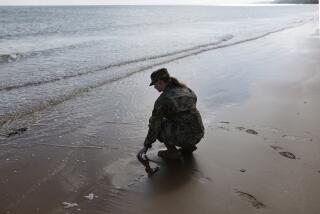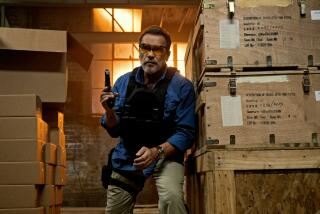Britons Quick to Rally ‘Round Flag, Recall Glory Days of Past Campaigns
- Share via
LONDON — The tattooed barman in the Old Blue Anchor pub in the city’s working-class Whitechapel district leaned forward over his pint of lager and said firmly: “We should have bombed the place from Day One. Wipe ‘em out. No prisoners. End of story, right?”
An hour later, in a fashionable Knightsbridge restaurant, a silver-haired countess echoed the sentiment, declaring: “We are very supportive of the forces. They are part of our society. We want to see them rid of Saddam Hussein right now.”
As they usually do in a crisis, Britons of all stations are rallying around the flag, carried by 40,000 United Kingdom service personnel in the Gulf, to a degree that may surprise many Americans. There’s nothing like a good war to awaken and energize the British from the torpor of everyday routine.
“There is a degree of martial enthusiasm in British culture that you don’t find in other Western countries,” observed Christopher Husbands, a sociologist at the London School of Economics.
Britons of all stripes seem almost to revel in the national memories of military exploits in their history, centuries of warfare with enemies ranging from the French to the Spanish, from the Dutch to the Germans and the Japanese. Fascination with the glory days of the empire, of World War II and, more recently, of the Falklands War against Argentina seems inexhaustible.
This is a society that is tolerant, even respectful, of former military officers continuing to use their ranks in private life.
Husbands also notes that the British have been involved in a limited military campaign in Northern Ireland for more than 20 years, along with various terrorist attacks: “The British are used to living with this. The Americans aren’t.”
Indeed, many Britons express dismay that Americans seem to be so adversely affected by the Gulf War. They cite reports that business executives have been told not to fly and note the sudden dearth of U.S. tourists in Britain.
The mood of patriotism here is fueled by the popular press, which is outdoing itself to sound a jingoistic line: “Our Heroes” trumpets the best-selling Sun over its Persian Gulf stories, while its competitor, the Daily Star, urges: “Go Get ‘Em, Boys.”
But the serious press, too, as well as television, is filled with pro-war editorials and commentary.
The newspapers have all signed on retired generals and admirals as military experts to discourse on the Gulf. And they delight in running stories about the return to action of the World War II singer Vera Lynn with her trademark song, “We’ll Meet Again.”
And the BBC, in a strange fit of patriotism, canceled the movie “Carry On Up the Khyber” because it shows soldiers in a comic setting and replaced it with “Carry On Cowboy.”
Before the war, a poll showed that 75% of Britons agreed that force was needed against Iraq if it did not pull out of Kuwait. This compares with prewar figures showing 70% of Germans, 53% of French, 51% of Italians and 46% of Americans being against hostilities.
Asked whether Iraqi President Saddam Hussein should be ousted from power even if he pulls out of Kuwait, 53% of Britons said yes. Only 34% opposed that action.
There have been peace demonstrations, to be sure, but the national sentiment by far runs in favor of the Gulf effort to rid Kuwait--and Iraq as well--of Hussein.
Actress Vanessa Redgrave, long famous for her pro-Palestinian views, is thought to have done the peace cause a disfavor by telling an audience: “We have to unconditionally defend Iraq against American, British and Israeli aggression.”
Even Robert A. K. Runcie, the Archbishop of Canterbury who is ordinarily identified with peaceful negotiations, has agreed that there is a valid case for conducting hostilities in the Gulf.
Thus Labor Party leader Neil Kinnock avoids identifying with the peace wing of his opposition party--presumably noting that Conservative Prime Minister John Major, a firm supporter of the allied commitment and a cool customer on television, has been receiving higher ratings in public opinion polls than any British leader since Winston Churchill in World War II.
Although the newspapers seem to be on the verge of war hysteria, the people themselves are relatively stoic about the war--paying much less attention to pictures of service families pining at home than the American public apparently does.
Partly, that is because the Northern Ireland campaign against the Irish Republican Army makes violent death seem more familiar. Over the more than two decades of that conflict the British have lost 618 soldiers killed, yet there has been little serious opposition to the idea of keeping troops there.
Britons have had troops stationed far from home since the growth of their empire in the 18th Century, and sending an expeditionary force to a war zone tends not to create the fierce interest or controversy that a similar move might cause in the United States.
Britain’s volunteer armed forces are tough and well-trained and, their officers say, eager for action. They handily won their last war, a long-range and much-admired operation, routing the Argentines from the Falklands Islands in the southern Atlantic.
Robert M. Worcester, head of the polling group MORI, says that victory is viewed as a national triumph. Former Prime Minister Margaret Thatcher was thought to have been swept to reelection on the strength of her wartime leadership, a political bonus known as “the Falklands factor.”
In contrast, the long-running and inconclusive Vietnam War left a generation of Americans scarred, psychologically and in some cases physically, and profoundly mistrustful of the use of military power.
“The Vietnam War had a profound effect on the United States,” says Worcester.
The pollster also notes that the British have had dealings in the Middle East for many decades, “so that it doesn’t seem such alien soil, as it may to Americans.”
Then, too, the military tradition runs broader and deeper in British society than it does in the United States.
“All of us have sons or brothers who have been military officers,” said one Englishwoman, adding with the characteristic class-consciousness of a society in which ordinary soldiers have traditionally come from the working classes: “But sergeants and sergeant-majors have a certain status in our society, too.”
Indeed, during the Falklands War, opposition Labor Party leader Michael Foot found himself out of step with most of his working-class party members who wholeheartedly supported the war.
“Foot and his intellectual friends in Hampstead were against the Falklands War,” recalls one observer, referring to a district of north-central London. “But the longshoreman in Liverpool was more hawkish than Conservative Party members. It was the dockers who really wanted to bash the Argies.”
In fact, there is a violent streak in British society that some Americans, perhaps influenced by images of cricket and the Queensberry rules from films and novels, might overlook. But Europeans, used to the ready-fisted, rough tribal behavior of British soccer fans at international games, have no such illusions about English gentility.
To a nation of such toughs, American doubts, fears and protests seem like lack of the proper spirit.
British papers gave negative play to the news that such Hollywood stars as Clint Eastwood and Carrie Fisher canceled appearances in London on the advice of their studios once the Gulf War broke out.
And as they did when U.S. bombers attacked Libya from British airfields in 1986, the journals needled actor Sylvester Stallone, of “Rambo” fame, this time for canceling a scheduled trip to the Swiss ski resort of St. Moritz.
Even the sober Financial Times, under the headline “Americans Can’t Master the Stiff Upper Lip,” commented: “The American public is having an anxiety attack over the war.”
More to Read
Sign up for Essential California
The most important California stories and recommendations in your inbox every morning.
You may occasionally receive promotional content from the Los Angeles Times.













